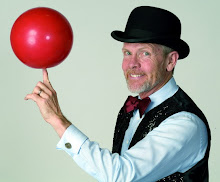I guess it's not surprising that so many people know so little about blood clots. I certainly didn't until my body started producing them. Those two deep-vein-thrombosis (DVT) clots and the recent death of my nephew Jon prompt me to suggest a few things I think you should know about blood clots you may develop. (Folks have asked me about this...)
First of all, please understand that almost anyone, it seems, can develop a blood clot. Your age doesn't seem to matter (Jon was 24 and I'm 63). Your physical size and your physical condition don't seem to matter. And your gender doesn't seem to matter either. There may be a genetic predisposition to clotting, but that won't guarantee that you will or won't develop clots somewhere in your lifetime.
So, there are many causes of blood clots, as described in this article: http://www.insideheart.com/causes-of-blood-clots.html (with thanks to Pooja for posting this link back in late April!) But in addition, I'd like to address the issues of "How do you know if you've got one?" and "What do you do if you think you do have one?"
"How do you know?"
I've been thinking about the experiences that Jon and I shared, based on what I've learned from Jon's dad. I will grant you that a patient sample size of two is quite small and unscientific, but it's the best I can do. If you've got a clearer idea, please feel free to post that information!!
Jon and I both experienced pain -- me in my calf and Jon in his chest. The pain lasted for several days, getting somewhat stronger or weaker from time to time. The thing we both had in common here was we couldn't think of any reason for the pain. I hadn't been playing Rugby, doing wind sprints, or doing anything other unusual strenuous activity. The pain felt very much like a muscle pull, and Jon's dad seemed to be saying that was what Jon felt as well. In addition, the normal stretching or other palliative activities that might have alleviated the pain weren't working.
(Swelling in the affected area is noted in the literature as a symptom, but I didn't experience much of that...)
So Jon and I each had several days' notice that there was a problem. Fortunately for me, the staff at my radiation-therapy doctor's office picked up immediately on the symptom (which they noticed since I came to their office on crutches) and directed me to the hospital -- stat. As I understand it from Jon's dad, his doctors were still working through other possible causes for his pain. And they didn't come up with the right answer in time.
"What do you do?"
Get it checked out. Do not wait for it to get better all by itself!!
The level of pain Jon and I felt was considerable, and (as mentioned) we couldn't think of any activity which might have caused it. That's your symptom. It ain't much, I grant you, but it helps explain to me why (according to one website I saw) 200,000 people a year die of this. It's just so subtle.
Now, this is strictly me speaking: If you start feeling a pain you can't explain and your medical practitioner starts looking for other causes, that's fine. But you have the right to ask him/her: "Could this be a blood clot? Should I get an ultrasound? A sonogram?"
And listen carefully to the answer. And if you're not comfortable with it, maybe you should ask someone else.
Subscribe to:
Post Comments (Atom)

I hope I never need this info. Thanks, Randy.
ReplyDeleteSue
Randy, this is a clear and simple orientation. It's easy to remember those two key symptoms plus your simple "what to do" instructions. Thank you!
ReplyDeleteY'know, whenever I think about how a simple little mishap -- like maybe a tiny bit of my gallon or so of blood decides to clump up for some reason, or maybe one tiny leak springs somewhere important in my many miles of cardiovascular plumbing, or maybe a grain of something lodges in some vital duct -- and then I consider how many minutes I've been walking around on the earth pretty much unaware of the universe of tiny industry chugging away inside of me at every moment....well, I just think it's a miracle that we keep on living.